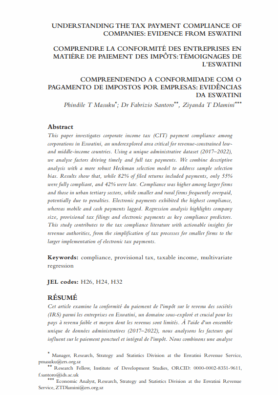This paper investigates corporate income tax (CIT) payment compliance among corporations in Eswatini, an underexplored area critical for revenue-constrained low and middle-income countries. Using a unique administrative dataset (2017–2022), we analyse factors driving timely and full tax payments. We combine descriptive analysis with a more robust Heckman selection model to address sample selection bias. Results show that, while 82% of filed returns included payments, only 55% were fully compliant, and 42% were late. Compliance was higher among larger firms and those in urban tertiary sectors, while smaller and rural firms frequently overpaid, potentially due to penalties. Electronic payments exhibited the highest compliance, whereas mobile and cash payments lagged. Regression analysis highlights company size, provisional tax filings and electronic payments as key compliance predictors. This study contributes to the tax compliance literature with actionable insights for revenue authorities, from the simplification of tax processes for smaller firms to the larger implementation of electronic tax payments.
Journal Article
